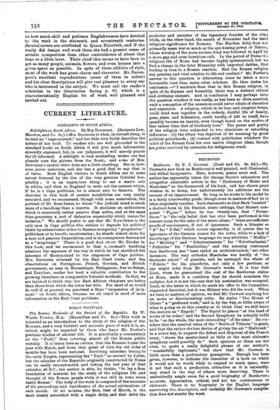CURRENT LITERATURE.
SIDELIGHTS ON SOUTH AFRICA.
Sidelights on Routh. Africa. By Roy Devereux. (Sampson Low, Marston, and Co. 6s.)—Mrs. Devereux is what, incurrent slang, is termed an "impressionist," and her title very fairly describes the nature of her book. To readers who are well grounded in the standard books on South Africa it will give much information shrewdly expressed, but, in our judgment, it will merely puzzle the ill informed. A sidelight is very misleading unless one has already seen the picture from the front; and some of Mrs. Devereux's caustic obiter dicta are a little startling. She is, how- ever, never malicious, and she has a good deal to say that is of value. Most English visitors to South Africa are to some extent fettered by the ties of the very genuine Colonial hos- pitality ; it is an ungracious thing to eat a man's salt in Africa, and then in England to mete out the censure which, if he is a Cape politician, he is almost sure to deserve. The sketches in this book of certain notabilities are very neatly executed, and we recommend, though with some reservation, the portrait of Mr. Rose-Innes, to whom "the judicial mind is much more of a handicap than a reserve. It sterilises an enthusiasm which is essentially rather passive than active, and at the same time generates a sort of defensive superiority which makes for isolation." We should prefer to say that Mr. Rose. Ines is the only man in Cape politics who refuses to degrade his political ideals by subservience either to finance-mongering " progressive " politicians or to bucolic reactionaries ; he stands almost alone for a sane and genuine Imperialism, and is in consequence denounced as a "mugwump." There is a good deal about Mr. Rhodes in this book, and we recommend to that st...tesman's headlong admirers the exposure of the way in which he has sacrificed the interests of ffashonsland to the exigencies of Cape politics. Mrs. Deverenz returned by the East Coast route, and her observations on Portuguese, French, German, and British government, as seen in Mozambique, Madagascar, Dares-Salam, and Zanzibar, reader her book a valuable contribution to the growing literature on comparative Colonial methods. In fact, we are inclined to think that her East African chapters are better than those from which she takes her title. For most of us would do well if, at present, we practised a Stoic "suspension of judg- ment ' on South Africa, whereas we all stand in need of more information on the East Coast problems.


















































 Previous page
Previous page